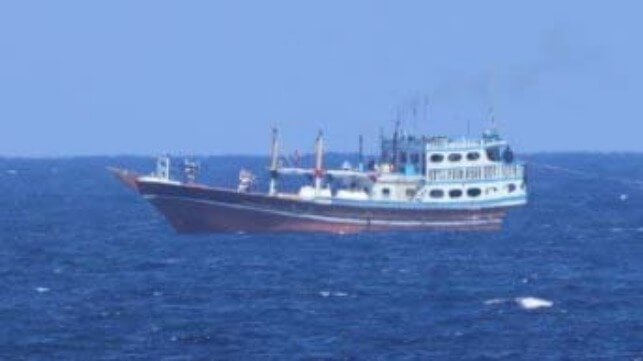Upon assuming the US presidency, Joe Biden asserted in his first major foreign policy address, “America is back!” For Latin America and the Caribbean, this has meant an “aggressive expansion” of the US military in the region.
In just the last year, US Marines and special forces landed in Peru in May 2023, brought in by the unelected rightwing government to address internal unrest. In October, the US got the UN Security Council to approve the military occupation of Haiti using proxy troops from Kenya. Also in October, the rightwing government of Ecuador resorted to deploying US troops to deal with their domestic insecurities. This month, Mexico and Peru joined the annual US naval exercises in mock war against China. And that just scratches the surface of US military engagement in the region.
Militarizing diplomacy
The Pentagon, along with the National Security Council and even the CIA, have taken on an increasingly pronounced role in diplomatic relations formerly the purview of the State Department. Former CIA agent and current US ambassador to Peru Lisa Kenna, for instance, was implicated in the overthrow of the elected leftist president there a year ago.
This drift in diplomatic function to the military became more pronounced with the appointment of Laura Richardson as head of the US Southern Command in October 2021. When asked about her interest in the region, she unapologetically admitted that the US seeks hegemony over the region and possession of its rich resources.
In January 2022, General Richardson signed a bilateral agreement with Honduras. She met with Brazilian and Colombian military brass last May. Previously, she had visited Argentina, Chile, Guyana, and Surinam. From August to September 2022, US and Colombian militaries conducted joint NATO exercises, while Richardson made a five-day visit to meet with the newly elected Colombian president. This week, she is meeting with the president of Ecuador, who declared his country is under a state of “internal armed conflict.”
Status of US military forces in the region
Washington is by far the largest source of military aid, supplies, and training in the region. The US has twelve military bases each in Panama and Puerto Rico, nine in Colombia, eight in Peru, three in Honduras, and two in Paraguay, along with military installations in Aruba, Costa Rica, El Salvador, Cuba (Guantanamo), and Peru.
In total, the US has 76 bases in the region as of 2018, plus numerous “unconfirmed operational bases.” All function as military centers as well as cyberwarfare posts. Among the problems associated with these bases are displacement of resources that otherwise would be used for social programs. These installations are notorious for their lack of transparency and accountability. In addition, they cause ecological damage with little or no provisions for environmental cleanup.
The US also has, in addition to bases, major military operations in Argentina, Ecuador, Uruguay, Guatemala, Bolivia, and Mexico. Colombia is a “global NATO partner” and Brazil is an “extra-NATO preferential ally.” The State Partnership Program of the US National Guard joins eighteen states, Puerto Rico, and the District of Columbia in active partnerships with militaries in 24 regional countries.
Evolving US military mission
The post World War II mission of the US military has evolved: first, the fight against communism ending around 1991; then the “drug wars” continuing to the present; followed by the “war on terror” and combating transnational criminal networks of the early 2000s; and now great power competition.
Thus, US regional military strategy has pivoted from fighting communism, terrorism, and drugs to containing China and, to a lesser extent, Russia and even Iran. China is now the leading trading partner with South America and the second largest with the region as a whole, after the US. Some 21 or 31 regional countries have joined China’s Belt and Road Initiative. The Southern Command’s budget, which had declined in the 2010s, is now ballooning as the US gears up to confront China.
The Latin American “theater” is pitched by the Southern Command as a “nearby test bed” and “prime location for experimenting with and testing new technologies” to be used particularly against China. General Richardson warns that China is “a communist country that’s spreading its tentacles across the globe so far away from its homeland.”
The Southern Command has especially targeted Venezuela, Cuba, and Nicaragua because of their friendly relations with China and Russia. Key to the command’s strategy is disrupting regional unity in the Americas.
Development of US military tactics
In the bad old days of 1898-1934, Washington simply and nakedly sent its troops to take over the Dominican Republic, Cuba, Haiti, Honduras, Mexico, Nicaragua, and Panama. In the post-World War II years, the US still overthrew governments not to its liking the old fashioned way in Grenada in 1983 and Panama in 1989. But for the most part, the US has developed more sophisticated means of asserting its control.
Proxy armies using mercenaries were deployed against Cuba in 1961 in the Bay of Pigs invasion and in Nicaragua in the 1981-1990 contra war– both unsuccessful.
Increasingly in the last 75 years or so, covert operations have been employed. The CIA was created in 1947. By 1954, the agency helped engineer the overthrow of Guatemalan President Jacobo Arbenz in what has become known as the first of many CIA coups in the Americas.
From 1975 to 1980, the US-coordinated Operation Condor installed military dictatorships in Argentina, Bolivia, Brazil, Chile, Ecuador, Paraguay, Peru, and Uruguay. In the 1980s and early 1990s, the US sponsored “dirty wars” in El Salvador, Guatemala, and Nicaragua. Then in 1991 and again in 2004, Washington backed coups in Haiti, followed by coups in Honduras in 2009 and Boliva in 2019.
The US also fomented numerous unsuccessful coup attempts against Venezuela, most notably in 2002, but continuing to the present. Venezuelan President Nicolás Maduro revealed that four assassination plots were made against him and other high-ranking officials in 2023; the CIA and the DEA were accused. The US has posted a $15M bounty on Maduro’s head. Nicaragua, too, has been targeted, including a major coup attempt in 2018. Cuba, as well, has noted a recent uptick of US terror attacks.
Expanding scope of military missions
Combatting forest fires and other climate-driven disasters have recently been incorporated into the expanding US military scope. The militarists are not so much concerned about the environment as they are about perturbances that can upset the existing political order.
In October 2022, Colombia invited US and NATO military forces into the Amazon on the pretext that they could be repurposed to protect the environment. These new ecological tasks are best understood not as non-military functions but as the militarization of environmentalism. These environmentally “woke” missions operate under such cover as the NATO Science for Peace and Security Program and even the UN Environmental Program, which cooperates with NATO.
So-called “humanitarian missions” have also been incorporated into the expanding military scope. Former head of the Southern Command, Admiral Craig S. Faller, described such missions as an important component in strengthening military ties with “partners” in the region. He boasted of 25 countries participating in the US military’s regional “warfighting-focused exercises” in 2021. By the next year, his successor General Richardson referenced 28 regional “like-minded democracies.”
Perhaps the prime non-traditional mission for the US military in the region is “counter-narcotics.” A US military Security Force Assistance Brigade was sent to Panama and Colombia last May to curb drug smuggling as well as migration. The US troops work with other US agencies already in the region, including the Drug Enforcement Administration and Homeland Security.
Hybrid warfare
In addition to the explicitly military exercises, described above, the US has increasingly employed “hybrid warfare” to try to maintain its dominance in an emerging multipolar geopolitical context. Unilateral coercive economic measures are now imposed on over a quarter of humanity. Also known as sanctions, these tactics can be just as deadly as bombs.
Sanctions on Venezuela – started by Obama, intensified by Trump, and seamlessly continued by Biden – have taken their toll: over 100,00 deaths, 22% of children under five stunted, and over 300,000 chronic disease patients without access to treatment. Despite the UN nearly unanimously condemning the US blockade of Cuba for its devastating effects on civilians and as a violation of the UN Charter, ever-tightening economic warfare has left the island in crisis. Washington is also escalating the hybrid war against Nicaragua.
Return to gunboat diplomacy
With the new year and with Washington’s blessings, a British warship cruised into waters contested between Venezuela and Britain’s former colony, Guyana. The disputed Essequibo territory between Venezuela and Guyana became an international flashpoint in December.
The US Southern Command announced joint air operations with Guyana. US boots are already reportedly on the ground in Guyana. What is in essence an oil company landgrab by ExxonMobil is disrupting regional unity and is a Trojan horse for US military interference.
Waters at the southern end of the continent are also troubled with US-NATO nuclear submarine exercises around the Malvinas and the Southern Ocean. The US Army is working on the Master Plan for the Navigability of the Paraguay River.
With the new presidency of devotedly pro-Yankee Javier Milei in Argentina a month ago, the US is again pushing to install new military bases in the strategic triple border region of Argentina, Paraguay, and Brazil. The Wall Street Journal reports: “Milei has maintained strong support since taking office… as Argentines so far embrace austerity measures.” [emphasis added] The WSJ is referring to the financially secure elites who are not among the 40% below the poverty line in Argentina. The trade unions mounted a general strike on January 24.
In conclusion, the enduring extra-territorial protection of Yankee military power has always been for the purpose of controlling its southern neighbors, but has become more sophisticated and pervasive. In this two-hundred-first year of the Monroe Doctrine, Simón Bolívar’s words are ever more prescient: “The United States appears to be destined by providence to plague America with misery, in the name of freedom.”
Roger D. Harris is with the human rights organization Task Force on the Americas founded in 1985.



